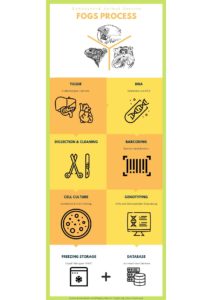What is FOGS?
Protected animals are traded illegally to a high degree, in Europe often to keep extravagant pets. The damage caused by these criminal and internationally operating activities is considerable for our biodiversity. Due to the taking from the wild, animal populations can hardly recover and species are becoming extinct. Studies show that environmental crime generates 100 to 260 billion US dollars in profits annually. Conservation authorities and law enforcement still lack routinely applicable and, above all, court-proof evidence to act effectively and protect these wild animals.
The FOGS project (Forensic Genetics for Species Protection), implemented by the Leibniz Institute for the Analysis of Biodiversity Change, Museum Koenig Bonn and funded by the German Federal Ministry of Education and Research (BMBF), is developing DNA-based tools to protect wildlife from being traded illegally.
These tools use a combination of genetic markers: the SNPSTR technology.
On the basis of the SNPSTR markers, the origin and the kinship of the animals examined can be determined with the respective DNA reference samples. For example, it can be determined whether the breeding programmes examined are actually legal offspring or whether hybrid breeding of protected birds of prey exists, which is prohibited by the Federal Species Protection Act. The analysis of these combined markers offers a very high genetic information content and even allows the differentiation of populations.

The FOGS Process The Tissue samples are sent from various cooperation partners, to be processed in the ZFMK laboratory for DNA extraction and cell culture. The DNA is then sent to the Genome Centre in Cologne to later determine specific SNPSTRs markers by sequencing. So the generated sequence information will be available in the FOGS database for use in forensic cases. While the DNA material is safely stored in the ZFMK biobank.
Contacts:
FOGS-Coordinator
Leibniz Institute for the Analysis of Biodiversity Change
Museum Koenig Bonn
Adenauerallee 127
53113 Bonn
